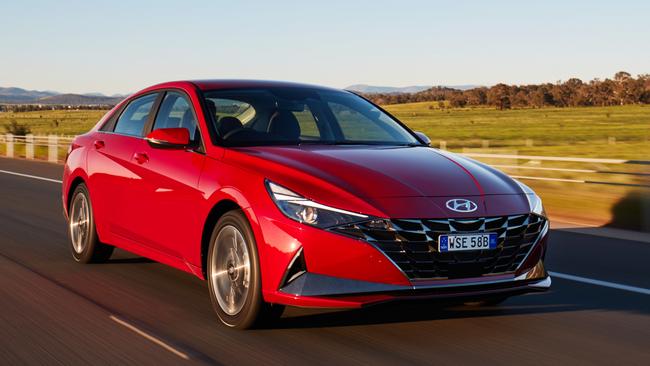Hyundai i30 sedan review: Off-trend car still has its strong points
Affordable, compact and practical, Hyundai’s newest member is unlike many new cars as the South Korean brand revamps an old favourite.
New Cars
Don't miss out on the headlines from New Cars. Followed categories will be added to My News.
Once upon a time, way back in the 20th century, long before SUVs and one-tonne utes ruled the roads of Australia, the most popular style of vehicle was a much lighter, lower four-door car with a large box in the middle for carrying people and a smaller box at each end.
The front box, as is still common practice, contained the engine; the rear one — called, for some strange reason, “the boot” — was the load compartment.
The four-door, three-box sedan is now almost extinct. Many car manufacturers have stopped making it altogether. Nobody wants a sedan any more. Why?
I’ve just done 2000km in Hyundai’s new i30 sedan trying to find out.

VALUE
The i30 sedan replaces the Elantra. Despite the shared name, it’s a completely different car to the i30 hatch, with a much longer wheelbase and more spacious cabin.
The sedan’s sharply-rendered sheet metal polarises opinions. I reckon it looks 1000 per cent more interesting than any SUV, but one of the Motoring team made gagging noises at it.
It is true that on first glance Hyundai looks to have fallen into the trap of using a few creases too many, especially the weird V treatment on the front doors.
But hey, it’s your money, so your opinion is the one that counts.
We’re testing the base model Active, priced at $26,790 plus on-road costs. Hyundai is still clearing the last Elantras, so there are no drive-away deals yet on i30 sedan. It’s short odds there soon will be.
That price is also nearly $3000 less than the base Tucson Active, Hyundai’s comparably-sized SUV.
The Active is powered by a 2.0-litre direct-injection petrol four-cylinder with a respectable 117kW of power and 191Nm of torque. A six-speed automatic is standard; a six-speed manual is $24,790.

A look around the austere cabin tells you that Active spec ain’t the Ritz, but leather-faced upholstery, wireless phone charging, a full-size spare on an alloy wheel and Apple CarPlay/Android Auto are standard.
COMFORT
A much lower, sportier driving position than the hatch (or any SUV), allows tall drivers to get comfortable without impinging upon rear seat legroom for similarly sized passengers.
You do have to duck under the low, raked, roofline to get in and out of the back, though, and it would be particularly irritating (not to mention painful) to have to do it regularly, such as when securing kids into restraints several times a day, for example. Score a tick to the SUV.
Similarly, although the boot is big by sedan standards, it’s smaller and a lot less versatile in terms of extending capacity and carrying large objects than Tucson’s cargo bay.

An SUV’s elevated stance and seating position will also give you a better view of the outside world, especially in traffic and when parking.
SAFETY
Active misses out on blind-spot monitoring and rear cross-traffic alert, standard on more expensive models. Hyundai Australia is not providing the i30 sedan to ANCAP for crash testing, because it believes that under ANCAP’s more rigorous protocols for 2020, the absence of an airbag between the front seats means it would probably fall short of the maximum five stars.
“We don’t predict crash test scores, but assuming everything performs as it should do, we would expect a four-star ANCAP score for i30 sedan,” a Hyundai spokesman told Motoring.
Hyundai’s lane-keep assist is unnecessarily intrusive and kicks in long before you get close to the lane markings. I turned it off.

DRIVING
The i30 confirms, yet again, that a well sorted sedan is usually a more capable and enjoyable machine to drive than a comparably sized and priced SUV.
The 2.0-litre is no jet but it’s reasonably tractable and responsive around town, smooth and quiet in cruise mode, pulls hard (and makes a bit of noise) when you need overtaking power and is a seamless fit with the six-speed automatic.
Expect about 6.0L/100km on the highway and 9-11L/100km in town, on regular unleaded.
The i30’s ride/handling compromise is exceptionally sophisticated for a car of this price. I’ve driven a lot of Audis, BMWs and Mercs that can’t match it on our rough roads, where Hyundai Australia’s local suspension tuning really shines. The light, tight i30 steers and corners with great precision and poise, while remaining solidly planted and compliant.
At comparable speeds in tighter corners, the much taller (and 255kg heavier) Tucson would be a more nervous, less comfortable proposition.

HEART SAYS
I don’t have a big budget but I want a car that looks like I do.
HEAD SAYS
I have no need for the practical attributes of an SUV. I want a car that I can enjoy driving. That’s what sedans are good at.
VERDICT 3.5/5
The sedan vs SUV choice is between everyday practicality and driving pleasure. If the latter is your priority, the i30 sedan delivers happiness at the right price.
ALTERNATIVES
Subaru Impreza Premium, from $28,590 plus on roads
Distinctly non-sporty performance from its 115kW/196Nm 2.0-litre/CVT. All-wheel-drive. Uses 6.6L/100km. Satnav and sunroof standard.
Toyota Corolla Ascent Sport, from $25,395 plus on roads
Toyota’s 2.0-litre engine matched to a CVT auto is responsive, tractable and efficient. 6.0L/100km average. Comparable in size but not quite as well equipped as the Hyundai.
HYUNDAI i30 ACTIVE SEDAN VITALS
Price: $26,790 plus on-roads
Warranty/servicing: 5 years; $1495 for 5 years
Engine: 2.0-litre 4-cyl, 117kW/191Nm
Safety: No ANCAP rating, auto emergency braking, adaptive cruise, lane-departure warning, lane-keep assist
Thirst: 7.0L/100km
Spare: Full size
Boot: 474L
Originally published as Hyundai i30 sedan review: Off-trend car still has its strong points


